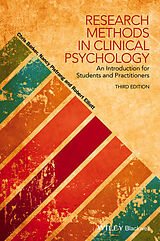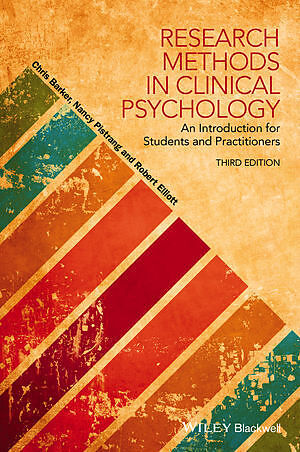Research Methods in Clinical Psychology
Einband:
Kartonierter Einband
EAN:
9781118773208
Untertitel:
An Introduction for Students and Practitioners
Genre:
Psychologie & Esoterik
Autor:
Chris Barker, Pistrang Nancy, Elliott Robert
Herausgeber:
John Wiley & Sons
Auflage:
3. Auflage
Anzahl Seiten:
320
Erscheinungsdatum:
11.12.2015
ISBN:
978-1-118-77320-8
Fully updated to reflect the latest developments, the third edition of Research Methods In Clinical Psychology offers a comprehensive introduction to the various methods, approaches, and strategies for conducting research in the clinical psychology field.
* Represents the most accessible, user-friendly introduction to conducting and evaluating research for clinical psychologists and related professionals
* Ideal for students and practitioners who wish to conduct their own research or gain a better understanding of published research
* Addresses important issues such as philosophical underpinnings of various methodologies, along with socio-political issues that arise in clinical and community settings
* Step-by-step guidance through all phases of a clinical psychology research project--from initial concept and groundwork, through to measurement, design, analysis, and interpretation
* Updates to this edition include new or expanded coverage of such topics as systematic review and literature searching methods, modern psychometric methods, guidance on choosing between different qualitative approaches, and conducting psychological research via the Internet
Autorentext
Chris Barker is Professor of Clinical Psychology in the Department of Clinical, Educational and Health Psychology at UCL, UK, where he was formerly the joint Research Director on the Doctoral Program in Clinical Psychology.
Nancy Pistrang is Professor of Clinical Psychology in the Department of Clinical, Educational and Health Psychology at UCL, UK, where she was formerly the joint Research Director on the Doctoral Program in Clinical Psychology.
Robert Elliott is Professor of Counselling at the University of Strathclyde, UK, and Emeritus Professor of Psychology at the University of Toledo, USA. He is a former President of the Society for Psychotherapy Research and former co-editor of the journals Psychotherapy Research and Person-Centered Counselling and Psychotherapy.
Klappentext
Fully updated to reflect the latest developments in the field, the 3rd edition of Research Methods In Clinical Psychology enhances its reputation as the most comprehensive and user-friendly introduction to conducting and understanding research in clinical psychology. Readers are provided with step-by-step guidance through all phases of a research project-from initial concept and groundwork, through to measurement, design, analysis, and interpretation. Updates to this edition include new or expanded coverage of such topics as systematic review and literature searching methods, modern psychometric methods, guidance on choosing between different qualitative approaches, and conducting psychological research via the Internet. The text continues to provide a balanced coverage of qualitative and quantitative methodologies, addressing both established and innovative approaches. With its comprehensive coverage, Research Methods In Clinical Psychology, 3rd Edition, represents an essential resource for understanding contemporary research methodology in clinical psychology and related fields.
Inhalt
Preface to the Third Edition x 1 Introduction: The Research Process 1 The Research Process 3 2 Perspectives on Research 5 Philosophical Issues 6 What is Research? 6 What is Science? 12 Social and Political Issues 17 Professional Issues 18 The Intuitive Practitioner 19 The Scientist-Practitioner 20 The Applied Scientist 20 The Local Clinical Scientist 21 The Evidence-Based Practitioner 22 The Clinical Scientist 22 The Practice-Based Evidence Model 23 Comparison of Models 23 Implications for Clinical Training 24 Personal Issues 24 Why Do Clinical Psychologists Do Research? 25 Why Don't Clinical Psychologists Do Research? 26 Weighing up the Pros and Cons of Doing Research 27 Chapter Summary 27 Further Reading 28 Questions for Reflection 28 3 Doing the Groundwork 29 Formulating the Research Questions 30 Choosing the Topic 31 Developing the Questions 32 Hypothesis-testing versus Exploratory Research Questions 33 Some Types of Research Question 34 Literature Review 37 The Proposal 41 Funding 44 The Politics of Research in Applied Settings 45 Access 45 Responding to Doubts 46 Authorship 48 Chapter Summary 48 Further Reading 49 Questions for Reflection 49 4 Foundations of Quantitative Measurement 50 The Process of Measurement 52 Domains of Variables 52 Measuring Psychological Constructs 52 Measurement Sources and Approaches 54 Foundations of Quantitative Methods 54 Positivism 55 Psychometric Theory 58 Definitions 58 Reliability 60 Reliability Statistics 62 Validity 64 Generalizability Theory 67 Item Response Theory 68 Utility 69 Standards for Reliability and Validity 70 Chapter Summary and Conclusions 71 Further Reading 71 Questions for Reflection 72 5 Foundations of Qualitative Methods 73 Historical Background 75 Philosophical Background 76 Phenomenology 77 Social Constructionism 79 Families of Qualitative Approaches 84 Thematic Analysis Approaches 84 Narrative Approaches 87 Language-Based Approaches 88 Ethnographic Approaches 90 Ways of Evaluating Qualitative Studies 91 Conclusion: Choosing and Combining Methods 92 Chapter Summary 94 Further Reading 94 Questions for Reflection 95 6 Self-Report Methods 96 Mode of Administration 99 Open-ended and Closed-ended Questions 100 Qualitative Self-report Methods 101 Types of Qualitative Interview 102 Interview Schedule 103 Interviewing Style 105 Quantitative Self-report Methods 109 Questionnaire Design 110 Chapter Summary 118 Further Reading 119 Questions for Reflection 119 7 Observation 120 Qualitative Observation 122 Participant Observation 122 Text-based Research 126 Quantitative Observation 128 Background 129 Procedures for Conducting Observations 130 Reliability and Validity Issues 134 Chapter Summary 135 Further Reading 136 Questions for Reflection 136 8 Foundations of Design 137 Nonexperimental Designs 138 Descriptive Designs 138 Correlational Designs 139 Experimental Designs 142 Cook and Campbell's Validity Analysis 144 Nonrandomized Designs 146 Randomized Designs 152 Conclusion: Choosing a Research Design 159 Chapter Summary 159 Further Reading 160 Questions for Reflection 161 9 Small?]N Designs 162 Historical Background 163 Single-case Experimental Designs 165 Procedure 165 AB Design 166 Reversal (or ABAB) Design 167 Multiple-baseline Design 168 Changing-Criterion Design 169 Data Analysis 169 Generalization 169 Naturalistic Case-study Designs 170 Narrative Case Studies 170 Systematic Case Studies 171 Time-Series Designs 175 Conclusion 175 Chapter Summary 176 Further Reading 176 Questions for Reflection 177 10 The Participants: Sampling and Ethics 178 Sampling 179 The Target Population 181 Bias and Representativeness 182 Sample Size 183 Alternative Approaches to Sampling and Generalizability 185 Summary and Conclusion 187 Ethical Issues 188 …

Leider konnten wir für diesen Artikel keine Preise ermitteln ...
billigbuch.ch sucht jetzt für Sie die besten Angebote ...
Die aktuellen Verkaufspreise von 6 Onlineshops werden in Realtime abgefragt.
Sie können das gewünschte Produkt anschliessend direkt beim Anbieter Ihrer Wahl bestellen.
Loading...
Die aktuellen Verkaufspreise von 6 Onlineshops werden in Realtime abgefragt.
Sie können das gewünschte Produkt anschliessend direkt beim Anbieter Ihrer Wahl bestellen.
| # | Onlineshop | Preis CHF | Versand CHF | Total CHF | ||
|---|---|---|---|---|---|---|
| 1 | Seller | 0.00 | 0.00 | 0.00 |
